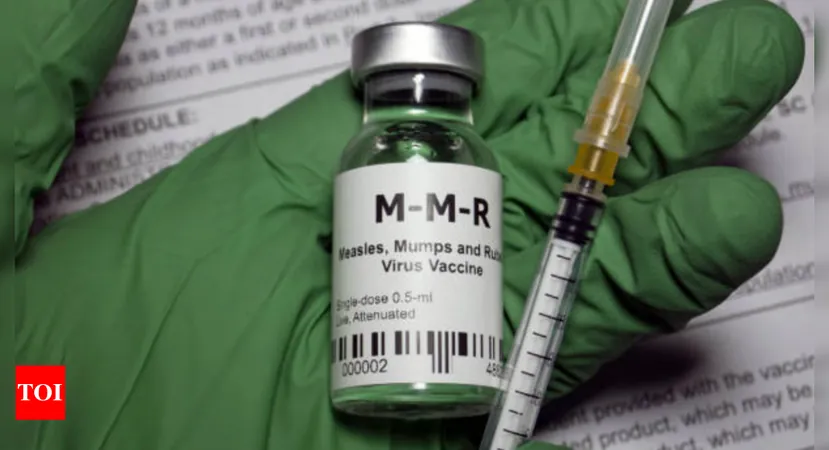
Why Unvaccinated Individuals Are Fueling the U.S. Measles Outbreak: The Urgent Call for Vaccination
2025-04-09
Author: Arjun
The Alarming Rise of Measles Cases
As measles cases surge across the United States, health experts are waving a red flag about the critical importance of vaccination. Recent reports indicate that out of 607 confirmed cases since April 3, 2025, a staggering 97% involved individuals who were either unvaccinated or whose vaccination status was unknown. This revelation raises pressing questions about the necessity of booster shots to maintain immunity against this highly contagious virus.
Understanding the Measles Vaccine
The Measles vaccine is administered as part of the MMR (Measles, Mumps, and Rubella) vaccine. Typically, children receive two doses: the first between 12-15 months and the second between 4-6 years. While a single dose provides about 93% protection, two doses enhance that to an impressive 97%. Since its introduction in 1963, the Measles vaccine has been improved, yet those vaccinated before 1968 may have received a less effective version.
What is a Vaccine Booster?
A booster shot acts as a reminder for your immune system, kickstarting its memory cells to enhance your ability to fend off infections. For those whose initial vaccination may not have offered full protection, a booster can significantly bolster immunity.
Who Needs a Measles Booster?
The requirement for a booster varies based on age, vaccination history, and exposure risks. Here’s who should consider getting a measles booster:
1. Adults Vaccinated Between 1963-1967
This cohort received an inactivated vaccine that didn’t provide robust immunity, making a booster advisable for stronger protection.
2. Adults Born Before 1957
While many in this age group are naturally immune due to past exposure, those unsure of their immunity should get a blood test.
3. High-Risk Groups
- **Healthcare Workers:** Regular exposure to infections makes complete vaccination crucial. - **International Travelers:** Traveling to regions where measles is still rampant necessitates a booster if immunity is uncertain. - **College Students:** Higher exposure risks in close quarters warrant ensuring vaccination. - **Those Unsure of Immunity:** Anyone with unclear vaccination history should consider an IgG blood test.
Who Should Avoid the MMR Vaccine?
While the MMR vaccine is generally safe, some should consult a medical professional before getting a booster: - **People with Severe Allergies:** Those who have known allergies to any vaccine components should skip the shot. - **Immunocompromised Individuals:** Patients undergoing chemotherapy or taking immunosuppressive drugs must consult their doctor prior to vaccination. - **Pregnant Women:** As the MMR vaccine contains a live virus, it’s advised to wait until after delivery to get vaccinated.
The Undeniable Importance of Vaccination
Despite medical advancements, measles remains a highly infectious disease. Vaccination is undeniably the best method of prevention. Adults might also require a booster, especially if they fall into high-risk groups or were vaccinated with older, less effective versions of the vaccine. Consulting healthcare providers to determine individualized vaccination needs is essential. Through education and awareness, we can all contribute to the collective goal of eradicating measles outbreaks.


 Brasil (PT)
Brasil (PT)
 Canada (EN)
Canada (EN)
 Chile (ES)
Chile (ES)
 Česko (CS)
Česko (CS)
 대한민국 (KO)
대한민국 (KO)
 España (ES)
España (ES)
 France (FR)
France (FR)
 Hong Kong (EN)
Hong Kong (EN)
 Italia (IT)
Italia (IT)
 日本 (JA)
日本 (JA)
 Magyarország (HU)
Magyarország (HU)
 Norge (NO)
Norge (NO)
 Polska (PL)
Polska (PL)
 Schweiz (DE)
Schweiz (DE)
 Singapore (EN)
Singapore (EN)
 Sverige (SV)
Sverige (SV)
 Suomi (FI)
Suomi (FI)
 Türkiye (TR)
Türkiye (TR)
 الإمارات العربية المتحدة (AR)
الإمارات العربية المتحدة (AR)